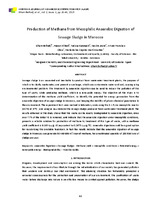Production of Methane from Mesophilic Anaerobic Digestion of Sewage Sludge in Morocco
Autor
Belhadj, Siham
El Bari, Hassan
Karouach, Fadoua
Joute, Yassine
Chica Pérez, Arturo F.
Martín Santos, María Ángeles
Editor
Esterdji PressFecha
2013Materia
Anaerobic DigestionSewage Sludge
Methane yield
Mesophilicconditions
Potential energy
Renewable energy
Biodegradability
Volatiles Solids
METS:
Mostrar el registro METSPREMIS:
Mostrar el registro PREMISMetadatos
Mostrar el registro completo del ítemResumen
Sewage sludge is an unwanted and inevitable by-product from wastewater treatment plants, the purpose of which is to clarify wastewater, and present a surcharge, which can contaminate water and soil, causing a big environmental problem. The treatment by anaerobic digestion can be used to reduce the pollution of this type of waste, while producing methane, which is a renewable energy. The objective of this study is to determination of the methane yield coefficient, to identify the potential for energy generationfrom the anaerobic digestion of sewage sludge in Morocco, and keeping the stability of physic-chemical parametersin the environment. The experiment test were realized in laboratory scale using the 1-L Pyrex mesophilic reactor (CSTR) at 37°C , and using as raw material the sewage sludge produced from wastewater treatment plant. The results obtained in this study shows that this waste can be readily biodegraded by anaerobic digestion, since over 77% of the initial VS is removed, and indicate that the anaerobic digestion under mesophilic conditions, presents a reliable solution for production of methane by treatment of this type of waste, with amethane yield coefficient is 0.245 LSTP/g VS(equivalent to 0.1975 LSTP/g TS).Anaerobic digestion could be a good option for revalorizing this availablefeedstock. In factthe results indicate that the anaerobic digestion of sewage sludge in Morocco, can generate 50 460000 m3/year of methane, for an estimated quantityof 255 500 tons of sludge per year.

